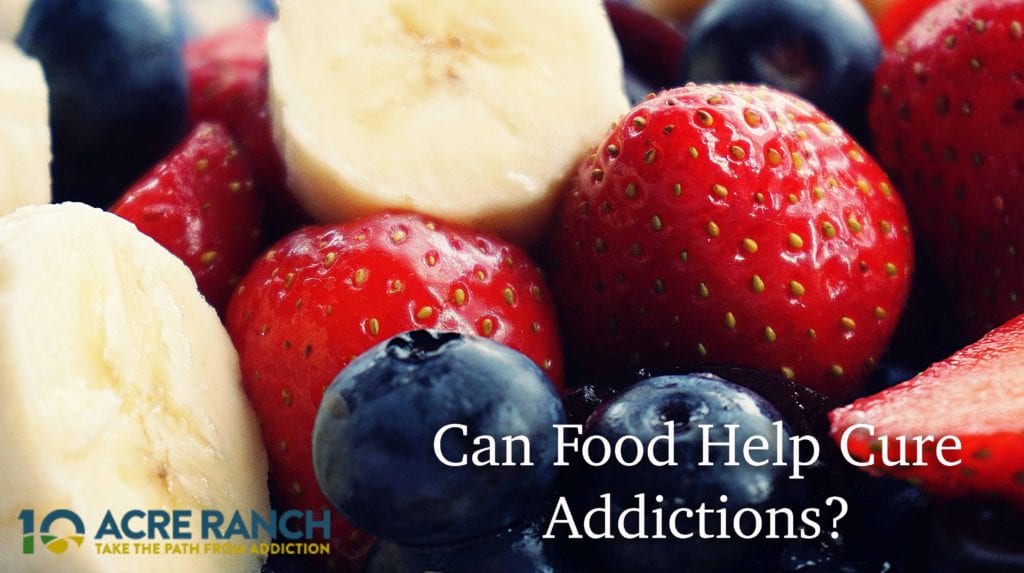
The role of nutrition and a proper diet in addiction recovery is an important but often overlooked one. Nutrition in a long-term substance abuse treatment program is often neglected due to lack of knowledge, negative conditions for recovery, or even the economic inability to afford healthy food for many recovering addicts. Different drugs of choice can be among many contributing factors to a patient’s overall malnutrition. Co-occurring mental health disorders may also play a part in the lack of eating healthy, nutritious foods.
Most people recognize or know that a substance use disorder contributes to destruction of relationships, legal troubles, loosing a job, financial troubles along with physical and mental health deterioration. Many fail to recognize that a lack of proper nutrition is a common issue that plagues people who have struggled with addiction and substance abuse problems. Some drugs cause you to eat too much, other commonly abused drugs will stifle your appetite. In the case of a long-term addiction to drugs, the substance may have created a mental stimulus that can cause someone to skip meals entirely, for days on end.
With alcohol abuse, the subject may replace their caloric intake for the day with the consumption of alcoholic beverages. This may cause them to feel full and not eat enough food for the day. As this problem persists over time, the alcoholic is more likely to experience some forms of malnutrition.
Opioid abuse can contribute to poor eating habits as well. Opiates like Oxycontin, codeine, methadone, heroin, hydrocodone and fentanyl cause euphoric feelings in the individual. They often cause drowsiness and nausea which can make it difficult to eat regular meals. As the drugs slow bodily functions, digestion becomes affected and many people who are abusing opioids experience constipation.
Stimulant abuse for drugs like crack, cocaine, methamphetamine, amphetamines, even nicotine and caffeine are all appetite suppressants. Using or abusing these drugs can make it difficult to even develop a desire for food, let alone eating regular, healthy meals. Since these drugs cause a loss or reduction of appetite, weight loss is common in people who become addicted to stimulant drugs. Cocaine abuse has been tied to anorexia and other eating disorders.
Marijuana use typically causes an increased appetite. It is also the most commonly used drug in the United States. For someone who has used marijuana for long periods of time, weight gain may become an issue. Marijuana users may require a reduced calorie diet and the effects on digestion from cannabis can take 3-6 months to return to normal.
How healthy, nutritious food can help you overcome drug & alcohol addiction.
Various drug rehab clinics will address nutrition because a healthy lifestyle can improve both physical and mental health. Eating healthy meals on a regular basis can assist in the addiction recovery process through:
- Scheduled, regular eating patterns can aid in reducing stress and stabilizing mood.
- Nourishing and healing organs and body tissues impacted by substance abuse.
- Reducing cravings and withdrawal symptoms from alcohol and drug abuse.
- Helping address medical conditions and problems compounded by substance abuse.
- Encouraging an overall healthy lifestyle through making healthy choices.
“Nutrition education is an essential component of substance abuse treatment programs and can enhance substance abuse treatment outcomes. Dietitians should promote and encourage the inclusion of nutrition education into substance abuse treatment programs.” – NCBI (National Center for Biotechnology Information)
Nutritional therapy can greatly increase the effectiveness of drug abuse treatment programs. It turns out, eating healthy can really help people who are recovering from addiction feel better, both mentally and physically. Combined with regular exercise and strength training, proper nutrition is an essential component of a successful recovery plan. As these efforts will greatly improve the physical health of the patients, they also help train the mind to act in it’s own self interest by developing healthy habits to replace the old, unhealthy ones.
An addiction is by itself a dangerous activity for the human body. It’s not just the effects of the drugs that play a negative influence on the overall health of the individual. Addiction is often associated with a variety of bad habits and negative health implications. These harmful lifestyle choices which are associated with addiction include: not eating healthy, lack of exercise and irregular sleeping patterns. These patterns can all negatively affect the body and can result in major long-term health problems, including: diabetes, hypertension, weight gain and eating disorders like anorexia.
The importance of eating healthy, nutritious food while in recovery from alcohol and drug addiction.
Since substance abuse can dramatically alter the brain’s chemistry, it may be difficult for someone just beginning recovery to recognize the signals their body is sending them. Are they craving alcohol and drugs, or are they just hungry? This is a common occurrence for someone as many simply have forgotten what it feels like to be hungry and they will mistake the feeling as a desire to relapse. As such, studies have shown that people with poor eating habits are more likely to relapse during recovery, than those who eat regular meals.
At 10 Acre Ranch, we take our meal schedule very seriously.
We emphasize diet as part of a radical change in people’s lives. Our meal plan includes foods rich in healthy fresh ingredients with an emphasis on protein, healthy carbohydrates, probiotics, fatty acids and essential vitamins and minerals. We teach our clients to avoid fast food, sweets, caffeine and empty calorie intake. These foods can often become abused as a replacement for the substance abuse. Some people turn to sugary, unhealthy foods as a coping mechanism, so we avoid them from the start in our recovery program.
Since our recovery program focuses on a social model of recovery, all of our nutritional meals are prepared by the clients. When most people come to 10 Acre Ranch, they don’t know how to cook for themselves, or the components of a well-balanced, healthy meal. Clients will take turns preparing meals for everyone in the facility and cleaning up after the meals. This process helps them develop the skills they need to maintain their sobriety, long after they leave our facility. We call these Activities of Daily Living Skills (ADLS) and they are a cornerstone of our successful recovery program. To find out how 10 Acre Ranch can help you or a loved one recover from addiction, please call us today! We are available 24/7:
877-228-4679





3 Comments
Thank you for the excellent post
[…] normal things in life that we often take for granted, like healthy relationships, stable jobs, regular access to food, water, and shelter, the list goes on and on. This is because their addiction to drugs or alcohol […]
[…] or race, people from all walks of life can become addicted to things like drugs, alcohol, sex, food, or even gambling. Many who develop these addictions can allow them to take over their lives. One […]
Comments are closed for this article!